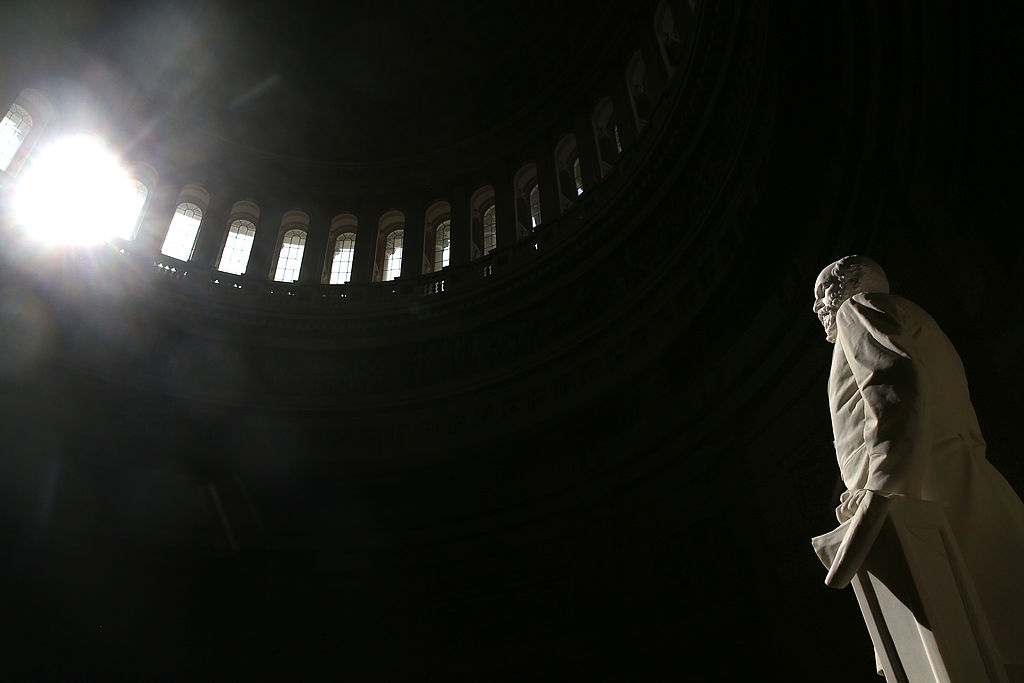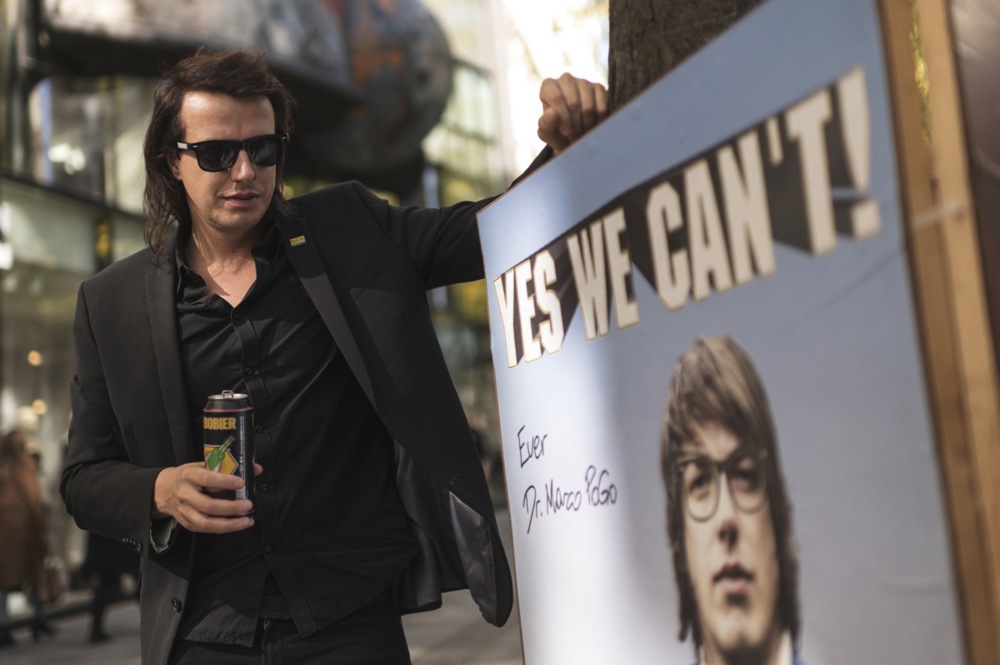Almost 41 years after losing the war over the Falkland Islands to Britain, Argentina has found its Latino version of then-prime minister Margaret Thatcher: President Javier Milei, who shares more than just his hairstyle with the late “Iron Lady”.
Ideologically, he has even more in common with her than any of his predecessors who occupied the offices of the Argentinian leader. Still, the eccentric economist, who likes to brandish a chainsaw (symbolising his plans to cut the federal budget) and is celebrated by his supporters for travelling economy class to Switzerland to berate the assembled global elite in Davos, has a Herculean task in front of him.
Politics in Latin America tend to swing from one extreme to the other, as demonstrated by Argentina’s northern neighbour: In Brazil, the right-wing conservative Jair Bolsonaro was succeeded by the “salon Marxist” President Luis Ignacio da Silva – and the next election could swing the pendulum back again.
Milei’s election victory was not just the result of a popular longing for change or a sudden appetite for libertarianism but also his near-perfect character presentation as someone who can channel the protest vote.
The question now is whether his populist appeal can be converted into a real reform agenda: Milei’s party, La Libertad Avanza, holds only seven of the 72 Senate seats and makes up 38 of the 257 federal MPs. It does not have a single governor in the provinces or mayor in urban centres. The new president is like a populist giant on feet of clay and without including former members of the previous centre-right government of Mauricio Macri, as well as occasional co-operation from left-leaning Peronistas on the local level, the planned reforms will quickly descend into political trench warfare.
In other words, Milei will have to transform himself from populist vote winner to bridge builder – not easily done in Argentina or Latin American politics in general.
There are signs, though, that Milei is awareness of this: He appointed Luis Caputo as economy minister and Patricia Bullrich as security minister, two prominent members of the previous government. In addition, some of his most radical proposals, such as disbanding the central bank or dollarizing the economy have already been put on ice.
The initial reform package, introduced in early February and containing 664 proposals, ultimately had to be cut in half to get through Congress. Originally Milei planned to privatise 41 state-owned enterprises but in the end that number was reduced to 27. The judiciary is also putting the brakes on what seems an overzealous reform agenda: The proposed legislation to reduce severance payments after dismissals and hugely liberalise the labour market was rejected as unconstitutional.
Yet Milei’s opponents should not get too comfortable: Given its climate, available natural resources and history as having been one of the wealthiest countries in the world in the first half of the 20th Century, the people have not forgotten that left-wing policies and military juntas have impoverished a once-prosperous nation.
Both the new Government and the opposition want to avoid any impression of anarchy and there is a least a tacit consensus across party lines that reforms are inevitable.
After decades of mismanagement by governments of all stripes, change will inevitably be associated with painful cuts in governmental spending and – hopefully short-lived – economic hardship. The wave of privatisations and already-executed subsidy cuts at the beginning of the year resulted in an annual inflation rate of more than 250 per cent for Argentina, a consequence not just of Milei’s zeal for reform but also of the decades-long policy of printing money.
It must not be forgotten that Argentina is the largest debtor of the International Monetary Fund with $40 billion (€37.25 billion) owed and has had to declare bankruptcy nine times in its economic history – the last time in 2020. The economic output per capita has stagnated at 2009 levels, while tiny neighbour Uruguay was able to record growth rates of above 40 per cent during the same period.
Neither Milei or his critics are able to reverse many years of mismanagement with a handful of reform packages. For decades the country was slipping from one crisis to the next, almost always ending in State bankruptcy and reducing the country to the status of an applicant for international financial support.
Required reforms will cause some economic distress – as the devaluation of the peso in December 2023 has shown: As a consequence, the poverty index shot up to 57.4 per cent.
“Six out of 10 Argentinians are poor,” Milei wrote on his social media channels in February but he insisted the current pain was a necessary requirement to address the country’s many structural problems. But there are signs that the reforms are beginning to have a positive effect: While inflation remains high, the rate of inflation has been declining for three months in a row, coming in at 11 per cent in March.
Also, the ongoing reforms are already strengthening Argentina’s credibility as an investment location and the first budget surplus in 12 years showed that the consolidation of public finances is being pursued seriously.
Despite the associated problems, Milei remains popular, with an approval rating of almost 50 per cent, and younger Argentinians support the President even more, with two out of three seeing his course as beneficial for the country.
Still, his popularity could prove short-lived if the promised economic upswing does not begin soon. One of the most interesting projects in this regard could be the potential exploitation of oil and gas reserves, which could prove economically viable relatively quickly thanks to modern fracking technology.
In Western media, Milei is pre-emptively dismissed as a “climate denier” but it is unlikely that such accusations will change the his ambitious plans.
Although largely ignored in Europe, South America has certainly noticed how the US has transformed from an energy importer to exporter thanks to new extraction methods.
What could also benefit Milei is the growing rejection of socialist experiments in his neighbouring States. The Chilean President Gabriel Boric is the Latin American version of a “woke” leader and is currently dragging the country into recession; the then-president of Peru, Pedro Castillo, was removed from office in late 2022 after attempting to create a more authoritarian form of government and Brazil’s President Lula da Silva is struggling with approval ratings below 40 per cent.
The political climate in the region means fundamental change is likely and nobody embodies this as much as Javier Milei. Although he is often perceived as a dogmatic ideologue, his first few months in office have shown his talent for pragmatism. This is evident not only in domestic but also in foreign policy: During the election campaign, Milei vehemently criticised the Brazilian president for his leftist policies and announced he would leave the Mercosur trade bloc between Argentina, Brazil, Paraguay and Uruguay.
He also promised wide-ranging support for Israel, presented himself as staunchly pro-American and hinted that he would break off relations with China because he did not “want to do business with Communists”.
After his victory, though, Milei softened his stance towards Beijing, a necessity given the close economic relations between the two countries. China buys almost 10 per cent of all Argentine exports (especially soy) and Chinese companies are also heavily involved in Argentina’s mining and infrastructure sectors.
The sharpness in tone towards Brazil has also noticeably softened and the new leadership in Buenos Aires is now striving to improve relations and supports Brazil’s effort to conclude a free-trade agreement between Mercosur and the European Union.
This pragmatism will be necessary: Milei must balance implementing reforms to stabilise and improve the Argentine economy while simultaneously dealing with the social backlash that such changes could trigger.
The need to reduce governmental spending and encourage private investment in Argentina is widely recognised as a necessary step for the long-term economic health of the country. Yet the short-term consequences would likely hit millions of Argentinians who currently rely on public subsidies, unfunded pension plans, money-transfer programmes and stable, albeit poorly paid, Government jobs.
Given the country’s history of street protests against economic liberalisation and the strong influence of Peronists on the unions, attempts to cut benefits could encounter significant resistance. Furthermore, the presence of former president Cristina Fernández de Kirchner in Congress, with her still considerable influence on Peronism, complicates the political landscape for Milei.
At this point, it is too early to speak of the success or failure of Milei’s presidency but it would be desirable for both Argentina and Latin America as a whole if the region could finally unleash its economic potential – thereby offering millions of people a better life.






The Middle East is not yet at the brink of all out war – but Iran’s missile attack on Israel has certainly made it closer